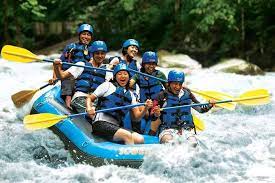Uncategorized
Showing the single result
Showing the single result
Class 1 Rapids – Easiest:
Slow to fast moving water. Some small waves and ripples along the way. Not many obstructions, easily visible
Class 2 Rapids – Easy:
The rapids are slightly larger than Class I. Channels are wide, clear and easily navigable. Maneuvering around some objects may be necessary but not difficult. If slightly more navigation is necessary or water is quicker, the rapid may be considered “Class II+”
Class 3 Rapids – Medium:
Moderately sized, irregular waves. Faster current and narrower passages. Large waves, obstructions, rocks can be easily avoided with precise maneuvering. Powerful currents and strong eddies. Injuries are rare.
Class 4 Rapids – Advanced:
Current is fast, rapids are long and difficult. Passages are constricted and may include unavoidable waves and holes. Scouting the rapid before is recommended to know the best route.
Class 5 Rapids – Expert:
Extremely long, complex and difficult. Waves are large and unavoidable. Drops, holes and steep chutes are common. Scouting is highly recommended.
Class 6 Rapids – Extreme:
These runs often exemplify the extremes of difficulty, unpredictability, and dangers of whitewater rafting. The consequences of errors are very severe!
Class 1 Rapids – Easiest: Slow to fast moving water. Some small waves and ripples along the way. Not many obstructions, easily visible
Class 2 Rapids – Easy: The rapids are slightly larger than Class I. Channels are wide, clear and easily navigable. Maneuvering around some objects may be necessary but not difficult. If slightly more navigation is necessary or water is quicker, the rapid may be considered “Class II+”
Class 3 – Medium: Moderately sized, irregular waves. Faster current and narrower passages. Large waves, obstructions, rocks can be easily avoided with precise maneuvering. Powerful currents and strong eddies. Injuries are rare.
Class 4 – Advanced: *Current is fast, rapids are long and difficult. Passages are constricted and may include unavoidable waves and holes. Scouting the rapid before is recommended to know the best route.
Class 5 – Expert: *Extremely long, complex and difficult. Waves are large and unavoidable. Drops, holes and steep chutes are common. Scouting is highly recommended.
Class 6 – Extreme: *These runs often exemplify the extremes of difficulty, unpredictability, and dangers of whitewater rafting. The consequences of errors are very severe!
